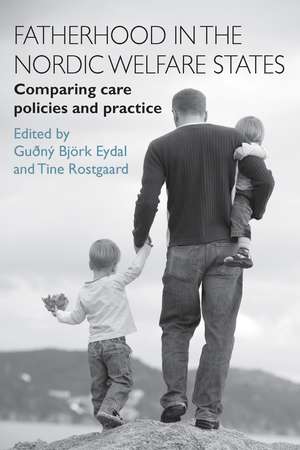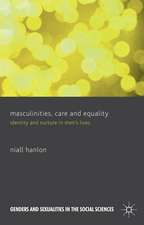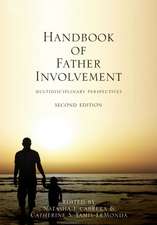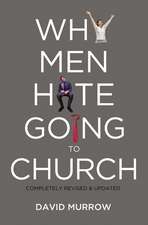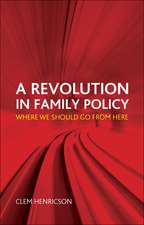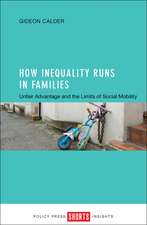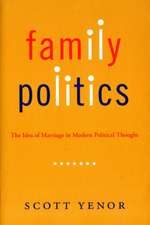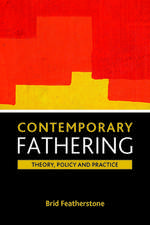Fatherhood in the Nordic Welfare States: Comparing Care Policies and Practice
Editat de Guöný Björk Eydal, Tine Rostgaarden Limba Engleză Paperback – 12 ian 2016
The Nordic countries are known worldwide for their extensive welfare system and gender equality, which enables both parents to hold jobs, earn money, and care for their children. In this volume, scholars from the Nordic countries, as well as from the United States and the United Kingdom, explore the effects of these policies on fatherhood, and how the policies that support it contribute to shaping and influencing the image, role, and practice of fathers in a diversity of family settings.
| Toate formatele și edițiile | Preț | Express |
|---|---|---|
| Paperback (1) | 417.40 lei 43-57 zile | |
| Bristol University Press – 12 ian 2016 | 417.40 lei 43-57 zile | |
| Hardback (1) | 839.36 lei 43-57 zile | |
| Bristol University Press – 25 noi 2014 | 839.36 lei 43-57 zile |
Preț: 417.40 lei
Nou
Puncte Express: 626
Preț estimativ în valută:
79.87€ • 83.61$ • 66.09£
79.87€ • 83.61$ • 66.09£
Carte tipărită la comandă
Livrare economică 07-21 aprilie
Preluare comenzi: 021 569.72.76
Specificații
ISBN-13: 9781447310488
ISBN-10: 1447310489
Pagini: 424
Dimensiuni: 152 x 229 x 25 mm
Greutate: 0.64 kg
Editura: Bristol University Press
Colecția Policy Press
ISBN-10: 1447310489
Pagini: 424
Dimensiuni: 152 x 229 x 25 mm
Greutate: 0.64 kg
Editura: Bristol University Press
Colecția Policy Press
Notă biografică
Guðný Björk Eydal is professor of social work at the University of Iceland. Tine Rostgaard is professor of political science at Aalborg University in Denmark.
Cuprins
List of tables and figures
Notes on contributors
Acknowledgements
1. One: Introduction
Guðný Björk Eydal and Tine Rostgaard
Theme 1: Fathers, families and family policies
2. Fathering: the influence of ideational factors for male fertility behaviour
Tine Rostgaard and Rasmus Juul Møberg
3. Nordic family law: new framework – new fatherhoods
Hrefna Friðriksdóttir
4. Fathers’ rights to family cash benefits in Nordic countries
Mia Hakovirta, Anita Haataja, Guðný Björk Eydal and Tine Rostgaard
Theme 2: Fathers in everyday life – culture, work and care
5. Time use of Finnish fathers – do institutions matter?
Minna Ylikännö, Hannu Pääkkönen and Mia Hakovirta
6. Parental leave and classed fathering practices in Norway
Berit Brandth and Elin Kvande
7. Negotiating leave in the workplace: leave practices and masculinity constructions among Danish fathers
Lotte Bloksgaard
8. Gender regime, attitudes towards childcare and actual involvement in childcare among fathers
Mikael Nordenmark
Theme 3: Constructing fatherhood in different family settings
9. Fathering as a learning process: breaking new ground in familiar territory
Steen Baagøe Nielsen and Allan Westerling
10. Minority ethnic men and fatherhood in a Danish context
Anika Liversage
11. Making space for fatherhood in gay men’s lives in Norway
Arnfinn J. Andersen
12. The long-term impacts of early paternal involvement in childcare in Denmark: what happens after nuclear family dissolution
Mai Heide Ottosen
Theme 4: Caring fathers and paid parental leave policies
13. The coming and going of the father’s quota in Denmark: consequences for fathers’ parental leave take-up
Tine Rostgaard and Mette Lausten
14. Policy goals and obstacles for fathers’ parental leave in Finland
Minna Salmi and Johanna Lammi-Taskula
15. Caring fathers and parental leave in prosperous times and times of crisis: the case of Iceland
Guðný Björk Eydal and Ingólfur V. Gíslason
16. Parental leave use for different fathers: a study of the impact of three Swedish parental leave reforms
Ann-Zofie Duvander and Mats Johansson
Theme 5: International reflections on findings
17. Parental leave and fathers: extending and deepening the knowledge base
Janet Gornick
18. Nordic fathers: tracking diversity and complexity
Margaret O’Brien
Conclusions: ‘What is constructed can be transformed’
Guðný Björk Eydal and Tine Rostgaard
Index
Notes on contributors
Acknowledgements
1. One: Introduction
Guðný Björk Eydal and Tine Rostgaard
Theme 1: Fathers, families and family policies
2. Fathering: the influence of ideational factors for male fertility behaviour
Tine Rostgaard and Rasmus Juul Møberg
3. Nordic family law: new framework – new fatherhoods
Hrefna Friðriksdóttir
4. Fathers’ rights to family cash benefits in Nordic countries
Mia Hakovirta, Anita Haataja, Guðný Björk Eydal and Tine Rostgaard
Theme 2: Fathers in everyday life – culture, work and care
5. Time use of Finnish fathers – do institutions matter?
Minna Ylikännö, Hannu Pääkkönen and Mia Hakovirta
6. Parental leave and classed fathering practices in Norway
Berit Brandth and Elin Kvande
7. Negotiating leave in the workplace: leave practices and masculinity constructions among Danish fathers
Lotte Bloksgaard
8. Gender regime, attitudes towards childcare and actual involvement in childcare among fathers
Mikael Nordenmark
Theme 3: Constructing fatherhood in different family settings
9. Fathering as a learning process: breaking new ground in familiar territory
Steen Baagøe Nielsen and Allan Westerling
10. Minority ethnic men and fatherhood in a Danish context
Anika Liversage
11. Making space for fatherhood in gay men’s lives in Norway
Arnfinn J. Andersen
12. The long-term impacts of early paternal involvement in childcare in Denmark: what happens after nuclear family dissolution
Mai Heide Ottosen
Theme 4: Caring fathers and paid parental leave policies
13. The coming and going of the father’s quota in Denmark: consequences for fathers’ parental leave take-up
Tine Rostgaard and Mette Lausten
14. Policy goals and obstacles for fathers’ parental leave in Finland
Minna Salmi and Johanna Lammi-Taskula
15. Caring fathers and parental leave in prosperous times and times of crisis: the case of Iceland
Guðný Björk Eydal and Ingólfur V. Gíslason
16. Parental leave use for different fathers: a study of the impact of three Swedish parental leave reforms
Ann-Zofie Duvander and Mats Johansson
Theme 5: International reflections on findings
17. Parental leave and fathers: extending and deepening the knowledge base
Janet Gornick
18. Nordic fathers: tracking diversity and complexity
Margaret O’Brien
Conclusions: ‘What is constructed can be transformed’
Guðný Björk Eydal and Tine Rostgaard
Index
Recenzii
“This comprehensive volume provides rich and theoretically grounded empirical analyses of Nordic policies and practices.”
"A fascinating, wide-ranging, and critical look at fatherhood in the Nordic world, covering home, work, and social policy, addressing growing diversity in these countries and celebrating a vibrant research scene.”
“At a time with a strong political focus on the falling birth rates, the book underscores the importance of men’s attitudes when attempting to understand what determines fertility rates.”
“This book is highly recommended to all scholars as well as students in the fields of comparative family policy, parenting, and fatherhood studies.”
